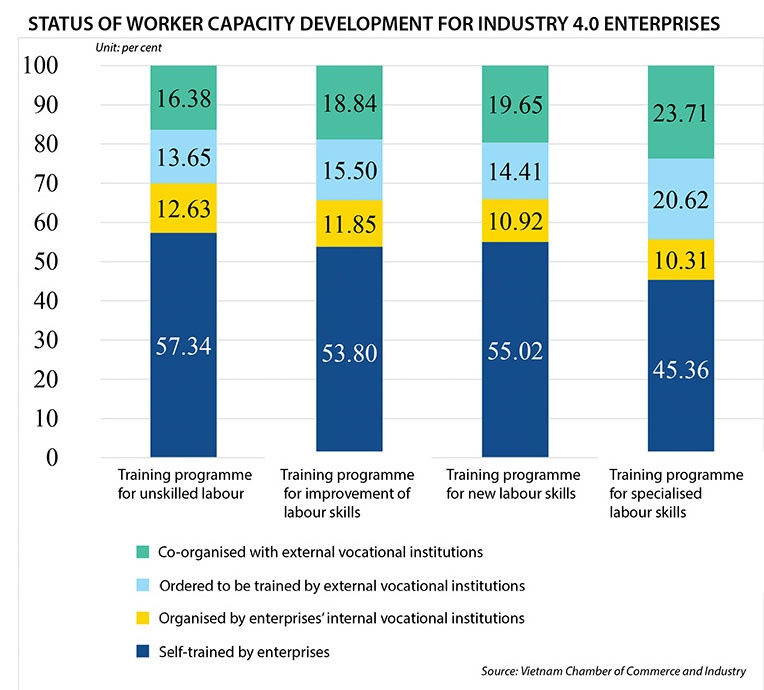Foreign groups circumvent lack of experts with training revamps
 |
Samsung SDS, South Korea’s leading system integration solutions provider, said it will double the number of developers in Vietnam and India by the end of this year to deal with increased technology maintenance demand in overseas factories.
Samsung is currently ramping up production of newly-released foldable phones – however, the hi-tech giant is also experiencing a domestic developer shortage.
Samsung SDS currently has 3,000 workers at its global delivery centres in Vietnam, India, and China, which are responsible for developing IT services in the local nations.
It aims to increase the number to 4,000 by the end of this year, which means having to recruit a large number of engineers and developers here to help strengthen manufacturing capacity for Samsung Electronics factories.
“As IT companies at home and abroad are actively utilising overseas manpower, Samsung SDS is making efforts to secure tech workers in foreign countries like Vietnam and India,” said a company representative.
The aggressive recruitment of overseas workers is part of Samsung SDS’s efforts to deal with the rapidly rising labour costs at home in recent years.
The company has recently partnered with one of Vietnam’s largest IT solution provider CMC Corporation to develop a strategic cooperation programme. It became the largest shareholder of CMC in 2019.
Samsung Vietnam has already been building a variety of training programmes and cooperating with local training institutions to build a new learning environment – not just for new employees, but for all employees at every level throughout the company.
According to the group’s training and development director Kim Dae Wook, Samsung Vietnam has made large investments in platforms supporting local workers to participate in advanced online training courses, especially in the context of the pandemic.
The impact of Industry 4.0 and challenges from the ongoing pandemic have caused many foreign-invested enterprises in Vietnam to increase demand for personnel at all levels in technology, application development, digital marketing, and general business.
Navigos Group’s forecasts on recruitment trends for the rest of this year and in early 2022 point out that electronics personnel are expected to have many job opportunities in the period because Bac Ninh, Haiphong, Bac Giang, Thanh Hoa, and Danang continue to receive huge funding from foreign-invested projects on building research and development centres for high-tech electronic products for major global brands.
In September, the LG Display factory in Haiphong announced that it was in need of 5,000 more production workers. Samsung also announced that it is looking to hire 1,000 production staff for its Bac Ninh factory.
Foxconn meanwhile has recruited 1,000 workers to assemble electronic parts for its plants in the northern provinces of Bac Giang and Bac Ninh.
Instead of recruiting highly-skilled foreign workers, which is a complex business currently, many companies have changed to training and improving skills for domestic workers to prepare sustainable human resources.
According to research by the Vietnam Chamber of Commerce and Industry earlier this year, on enterprises’ efforts to improve the capacity of workers for Industry 4.0, 80 per cent of such enterprises have already actively trained staff and fostered a culture to improve labour capacity.
However, while the advanced training accounts for a large proportion of 65.1 per cent and training for unskilled workers accounts for 57.6 per cent, the rate of specialised skills training for Industry 4.0 in particular is still low, at only 17.6 per cent.
Many businesses choose to cooperate with others in the same field or enterprises in the same supply chain to educate and improve the capacity of their employees.
Many labour experts said that following recruitment trends and providing continuous training are the best solutions to help businesses proactively prepare human resources for the digital transformation.
Christopher Lee, senior manager at PwC Vietnam said, “We cannot expect the education system to innovate in line with the speed of innovation in the industry. The only way to really capacitate the education system in all its width is to have more strategic partnerships with educational institutions.”
This involves, Lee says, having teachers that understand how to approach businesses, as well as establishing skills councils.
“These can be where businesses get together under the business membership organisation to aggregate their demands towards the education system,” Lee added. “The key to getting Vietnam ready for Industry 4.0 is really a closer collaboration between the education system and the private sector.”
What the stars mean:
★ Poor ★ ★ Promising ★★★ Good ★★★★ Very good ★★★★★ Exceptional
 Tag:
Tag:
Themes: Human Capital 4.0
Related Contents
Latest News
More News
- Masan Consumer names new deputy CEO to drive foods and beverages growth (February 23, 2026 | 20:52)
- Myriad risks ahead, but ones Vietnam can confront (February 20, 2026 | 15:02)
- Vietnam making the leap into AI and semiconductors (February 20, 2026 | 09:37)
- Funding must be activated for semiconductor success (February 20, 2026 | 09:20)
- Resilience as new benchmark for smarter infrastructure (February 19, 2026 | 20:35)
- A golden time to shine within ASEAN (February 19, 2026 | 20:22)
- Vietnam’s pivotal year for advancing sustainability (February 19, 2026 | 08:44)
- Strengthening the core role of industry and trade (February 19, 2026 | 08:35)
- Future orientations for healthcare improvements (February 19, 2026 | 08:29)
- Infrastructure orientations suitable for a new chapter (February 19, 2026 | 08:15)





















 Mobile Version
Mobile Version